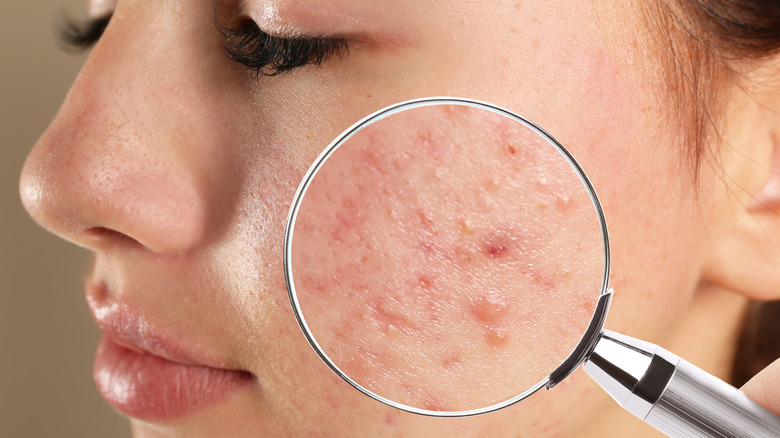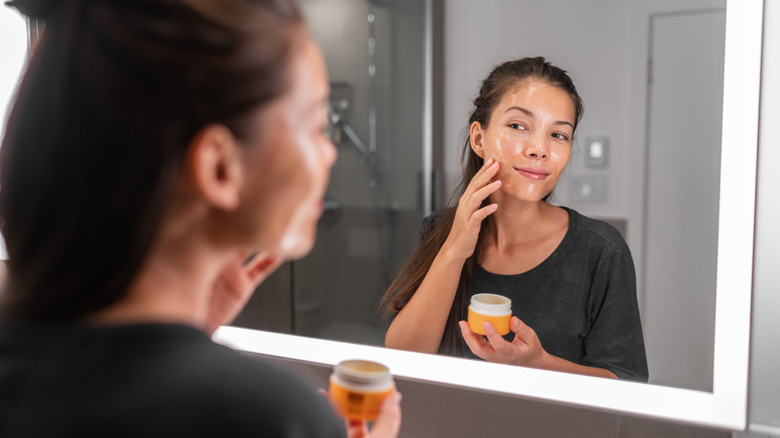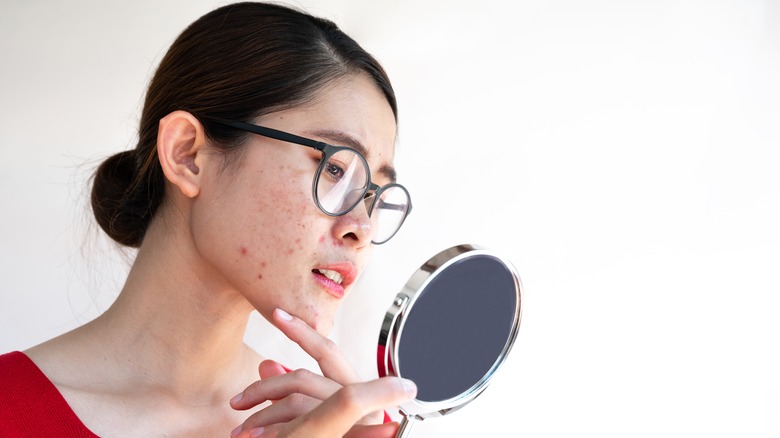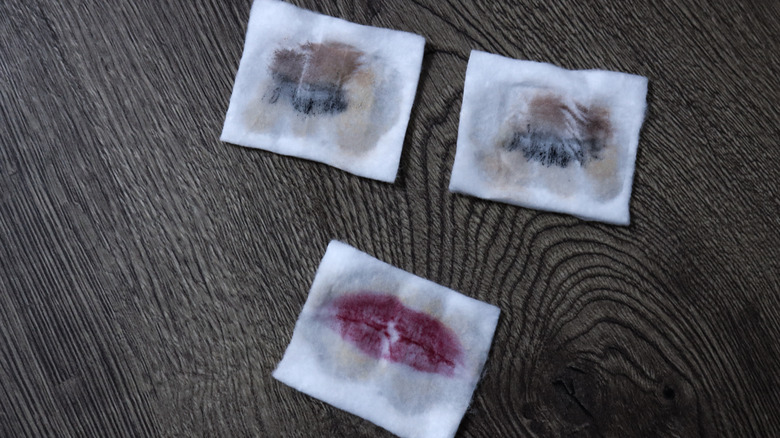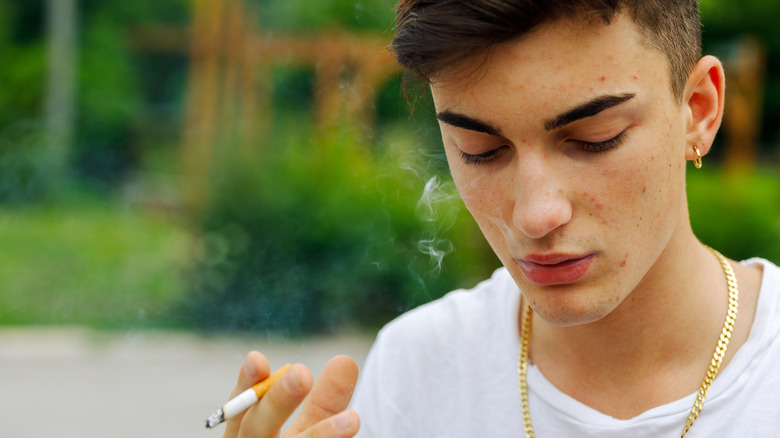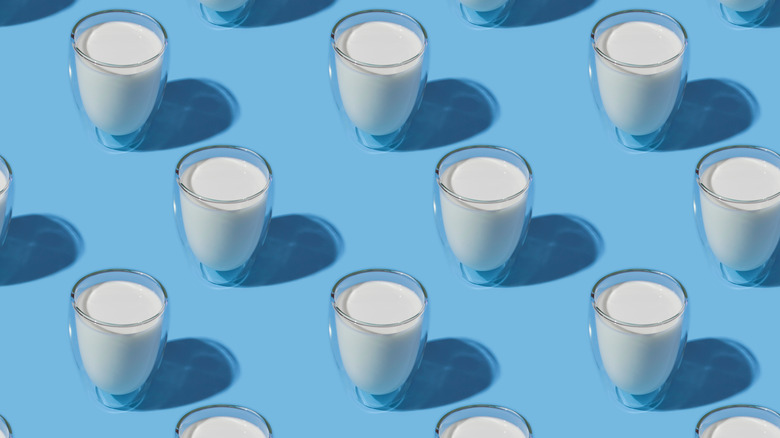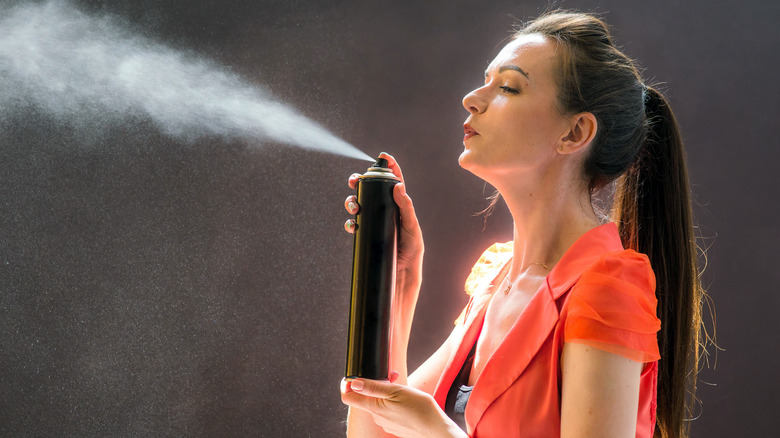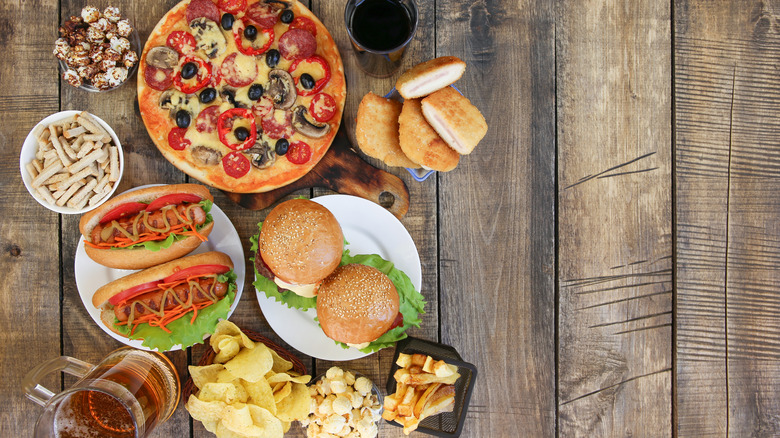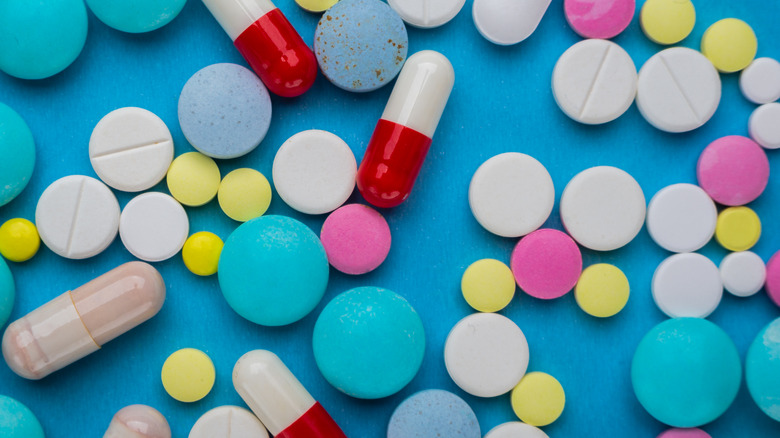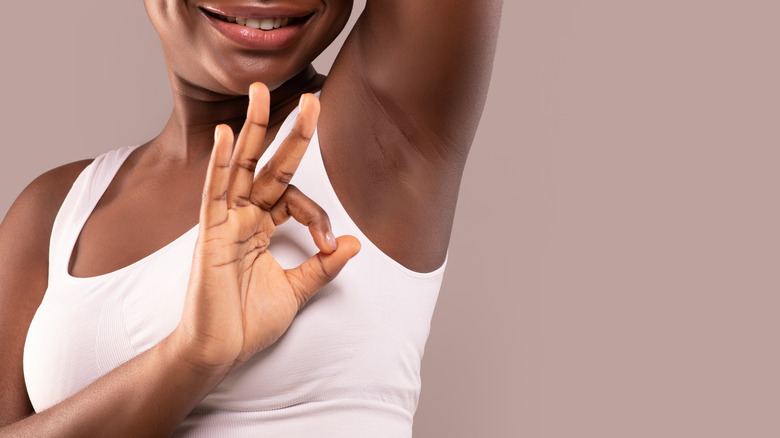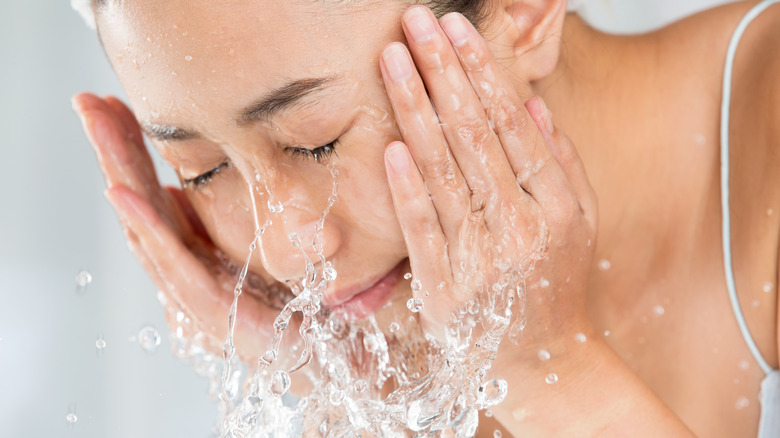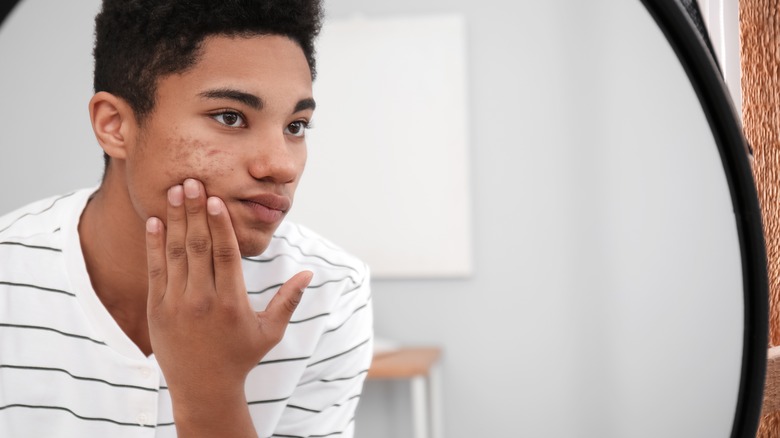14 Causes Of Acne Flare-Ups You Might Not Know
Acne isn't fun. The skin condition can be serious stress for anyone who experiences it, and with around 50 million people in the U.S. having acne per year, it's a common problem (per the American Academy of Dermatology Association). And acne isn't just a cosmetic concern, but a financial one too: In 2013, the business of treating or tending to acne amounted to a pretty penny, with the cost of lost work or spending on medicine coming to an enormous $1.2 billion.
It's little wonder that when it comes to our skin, we want to keep it acne-free. Unfortunately, though, sometimes acne seems to have a life of its own, and flare-ups can occur when we least expect them. That's why, if you experience acne, it's important to become familiar with triggers that might influence your skin health — and there are some out there that may well surprise you. Let's take a look at some surprising causes of acne flare-ups.
Using certain skincare products can cause acne
When we use skincare products, we naturally assume that they're going to make our skin happier and healthier. But in many cases, skincare products can actually be the cause of poorer skin health. Certain products, particularly those that contain oils, may clog your pores and irritate your skin, causing fresh breakouts or worsening an existing flare-up, says the American Academy of Dermatology Association (AAD). This can even be the case with oils that are marketed as skin-friendly. "Many of the 'natural' skincare lines will load up products with massive amounts of essential oils, and many of these can be irritating to already inflamed skin," advises skincare expert and celebrity esthetician Renée Rouleau to Byrdie.
Other ingredients can also cause your skin to flare up, particularly if it's on the sensitive side. Sodium lauryl sulfate (or SLS), a cleansing ingredient that can help clear oil and dirt, may inflame your skin and increase the likelihood of acne, according to both Rouleau and board-certified dermatologist Joshua Zeichner (via Byrdie). Ingredients added to certain moisturizers, like isopropyl myristate and isopropyl palmitate, may also promote pore-clogging and lead to blemishes.
If you're stressed, acne may rear its head
Our stress levels and our health levels can often go hand in hand — and this is definitely true when it comes to the health of our skin. "To prepare ourselves for a stressful environment, our bodies overproduce certain hormones like cortisol," as Mount Sinai Hospital's director of cosmetic and clinical research in dermatology, Joshua Zeichner, tells Glamour. These hormones cause our skin to produce more oil, which then settles itself in our pores — usually in oilier areas like the chin, forehead, and nose — resulting in acne.
Generally, you can tell if your acne is stress-related when you get a cluster of new pimples in one go (and feeling more stressed alongside that is usually a telltale sign). During times when you're feeling more stressed, it might be helpful to compensate with a healthier diet that avoids too many simple sugars and carbs and won't instigate further inflammation. Using a cleanser that contains salicylic acid during a stress acne event can also aid your skin in healing. "It will help remove excess oil and dead cells from the surface of your skin to keep your pores clear," says Zeichner (via Glamour).
Drinking alcohol can contribute to breakouts
Most of us know that drinking alcohol regularly isn't going to win you any health prizes, but what you might not be aware of is how alcohol can affect your skin. Although alcohol might not directly trigger an acne flare-up, there are numerous ways that drinking can contribute to worse skin health. The diuretic effects of alcohol are the first factor: When we drink booze, it can have a dehydrating effect, which then causes our skin to produce more oil that settles in our pores and creates blemishes (per Medical News Today). Drinking alcohol regularly over a longer period can also affect your immune system negatively, creating increased susceptibility to bacteria-causing acne.
There's also the matter of how you drink alcohol. "We can hypothesize that alcoholic beverages with high sugar content would be a 'double whammy,' thus increasing risk [of an acne flare-up]," says New York-based dermatologist Rachel Nazarian to Bon Appétit. This is in part due to the inflammatory effects that sugar can have, and partly because the alcohol itself can cause inflammation.
Your makeup wipe may be behind your flare-up
Removing your makeup thoroughly after a long day is meant to be step one in keeping your skin healthy and blemish-free. Unfortunately, the very product you use to do so may be contributing to your acne. "Using a wipe rather than a more thorough cleansing method could contribute to clogged pores and acne breakouts," states dermatologist Hadley King to Skincare.com. A standard makeup wipe may, quite simply, not be enough to adequately remove the buildup of makeup, oils, bacteria, and dead skin cells that make themselves at home on your face throughout the day. And if you have particularly oily skin or skin that's more likely to develop acne, a makeup wipe might not cut it.
The solution? Get thorough. "Start by using an oil-based cleanser to remove makeup and dirt, followed by a wipe that contains a water-based cleansing ingredient to finish the job," recommends board-certified dermatologist Joshua Zeichner to Skincare.com. If you really want to boost your skin-cleansing potential, using a cleanser or a wipe that's made with salicylic acid can be useful. Salicylic acid can reduce the oil levels of your skin, making flare-ups less likely.
Smoking may lead to an increased incidence of acne
Smoking has so many potentially negative consequences for your health that it's hard to keep track of them all. And it's not just on the inside that smoking affects you: It can have a powerful impact on the appearance and health of your skin. Smokers are way more likely to experience acne after adolescence, according to research published in Dermatoendicronology.
And the acne that smokers experience may be different from regular acne. People who smoke can get a form of breakout called atypical post-adolescent acne (or APAA), which is usually defined by more whiteheads and blackheads and fewer red pimples, says Verywell Health. The pathway for APAA is different from classic acne and is triggered in part by increased sebum peroxidation and the body making less vitamin E, which means that free radicals are more capable of attacking your skin. While vaping appears to have less of a destructive effect on skin cells than smoking, it may still cause dehydration, which can provoke acne.
Sleeping in your makeup? It could be the cause of your breakouts
Taking your makeup off before you go to bed can sometimes seem like one job too many. But if you're prone to acne, we'd seriously recommend it. "Sleeping with makeup is really bad, as your pores get will get clogged," says board-certified dermatologist and Mt. Sinai Hospital assistant clinical professor Samer Jaber to The Healthy. These clogged pores may result in breakouts, blemishes, and acne.
Leaving your makeup on overnight also hinders your skin's natural ability to replenish itself and maintain its natural health and glow, generally leading to poorer skin health overall. How you clean your face at the end of the day should depend on the type of skin you have, says Jaber. For less oily skin that tends toward sensitivity, use a gentle non-foaming cleanser; oilier skin types benefit from a cleanser that can develop a lather.
Drinking milk may cause flare-ups
Our diets affect our bodies in almost every way, and our skin health can also be impacted heavily by what we eat and drink. And when it comes to acne, certain foods may be more triggering than others. Milk and dairy may be particularly impactful on your skin, with dairy products being observed to contribute to acne in multiple studies, according to a research review published in The Journal of Clinical and Aesthetic Dermatology.
Why dairy seems to cause acne flare-ups, however, is less clear. One reason may be because of the higher levels of hormones present in dairy and milk products, which may unbalance your hormone levels and produce harmful effects on your skin. Dairy products may also provoke a change in your insulin levels, thereby causing your skin to become more prone to flare-ups. Removing or limiting dairy may allow you to control your skin's response — though it may take a few weeks to see the full result (via Business Insider).
If you use hair products, watch out where they end up
Hair products are meant for our hair and our hair alone, but anyone who's ever gotten a face full of hairspray while they're getting ready for a night out will know that's easier said than done. "Many times, what you're using on your hair winds up on your face, especially if you use products with spray applicators," says "Healing Adult Acne" author and Yardley Dermatology Associates director Richard Fried to Everyday Health. Unfortunately, these hair products can end up causing your pores to clog up, resulting in inflammation, pimples, and soreness.
As such, when using any styling products on your hair, be as careful as possible with application. Try, if possible, to avoid using any products that could inadvertently come into contact with your face, and keep them away from your hairline. It may also be useful to give your face a quick wash or wipe with a cleansing product after applying your hair stuff, to make sure there's no residue.
If you're catching a flight soon, be prepared for a potential acne breakout
Jetting off to a new destination may be exciting, but your skin may not thank you too much if you're acne-prone. Sitting in an airplane for hours on end can cause acne to flare up, thanks to the (lack of) moisture levels in the air. "The average humidity on a plane drops to 20% of normal [levels]. If your skin is normally dry, this can lead to the buildup of oil under the dehydrated skin cells," states Patricia Wexler, a dermatologist based in New York, to Allure. For people whose skin tends on the oilier side, this can be exacerbated by the drier plane air.
As your skin is losing moisture while you fly, there's one simple solution: Put moisture back in. Staying hydrated during a flight by regularly drinking water can help your skin stay moist and reduce the risk of acne breakouts. Exfoliating your skin before you jet off can also be a great idea, as the removal of dry skin on the top layer can help your pores stay clear.
Your diet may affect your likelihood of flare-ups
We tend to associate skin health mostly with how we treat it from the outside: What products we're using, how often we exfoliate, and how we protect it from the sun. And while it's certainly true that what we do with our skin topically has a direct effect, it's equally true that what we put inside our bodies affects it hugely.
Research published in JAMA Dermatology has noted that there's an association between the composition and quality of our diets and the prevalence of acne in adults. For people whose diets are higher in sugar and fat, there was an increased likelihood of acne compared to folks who ate these types of foods more moderately (per Harvard Health Publishing). Despite the link found by researchers, it should be noted that these findings do not necessarily prove that the acne was caused by diet, merely that there appears to be a correlation between the two. And there's some good news for chocolate-lovers out there: There appeared to be no link found in the research between acne and consuming milk or dark chocolate. Every cloud has a silver lining!
Taking certain medications may be causing your acne
Sometimes when we're seeking to treat one health condition, we may inadvertently cause another. This may be the case with acne, which can be prompted by taking specific medications — although it should be mentioned that a reaction like this is not only uncommon, but tends to produce a type of acne that isn't actually acne, says WebMD. Bear with us, we'll explain.
According to University of Texas Southwestern Medical Center's clinical professor of dermatology, Lisa A. Garner, the acne-like skin condition caused by medication is known as an "'acneiform drug eruption" (via WebMD). This is characterized by uniform red bumps or pustules, as opposed to the mix of blackheads and whiteheads that indicate true acne. Taking medications like corticosteroids, anticonvulsants, lithium, or barbiturates may result in a drug eruption on your skin. Other medications, however, may cause a more recognizable effect. "Androgenic steroids — especially taken by the men who are trying to bulk up in the gym — can give you terrible cystic acne," says Garner.
Your hair removal methods can be a trigger
Removing hair can be a real hassle. And annoyingly, things can get even worse after you remove it. Products that are put upon the skin to either ease hair removal before doing it, or to soothe skin afterward, may end up clogging your pores, according to Mount Sinai Medical Center's assistant clinical professor of dermatology Francesca Fusco via Everyday Health. What might be useful to remember, though, is that skin irritation caused by hair removal may not be "proper" acne. Instead, it's "an irritation of the hair follicle that causes a transient rash," resulting in an acne-like appearance, Fusco advises.
It's worth trying to prep your skin carefully before hair removal to minimize the chance of irritation. Cleaning skin thoroughly will reduce bacteria levels on your skin, lessening the chance that pathogens will work their way into your pores. But if you do develop irritated skin, treatment is your first port of call. Try dealing with the acne-like rash at home by placing a warm compress on your skin several times a day. If that doesn't help, you may need to start a course of antibiotics to clear it.
Washing your face too much may make your acne worse
When you're dealing with acne, it might be tempting to try and keep your face as clean as possible. After all, you want to clear those pores, right? Well, while cleaning your face routinely is paramount in acne management, you can very quickly overdo it, leading to your pimples potentially getting even worse, according to Verywell Health. When you clean your face too frequently, or too vigorously, you can end up stripping the natural oils that your face needs to stay moist and lubricated, and destroy the protective layer of bacteria, sweat, and oil, known as the acid mantle, that keeps your skin vibrant. All of this can lead to vulnerable, irritated skin, which makes acne worse.
It's important to remember that acne isn't necessarily caused by dirty skin, so washing your face all the time isn't the most helpful course of action. Washing your face twice daily, once in the morning and once in the evening, should be sufficient to keep your skin happy and healthy (although if your face gets really sweaty, like after a hard workout, an additional wash could be useful). Prioritize using a gentle cleanser that will keep irritation to a minimum.
Changing up your acne treatment too frequently may create problems
So, you've tried everything to tackle your acne. And when something doesn't work, you move on to the next product. Well folks, maybe that's the problem. Acne management can cause people to lurch from treatment to treatment without taking the time to see if the one they're using will work, and this can end up causing further flare-ups, according to the AAD. Not allowing a new acne treatment to take hold and do its magic, and switching to another too quickly, can cause skin irritation.
Bear in mind that acne treatments can take longer than we think to start working: Some of them take a good few weeks before you'll notice a positive difference, with several months passing before your acne starts to clear, according to Verywell Health. Acne treatments also need consistency to work. Make sure that you're taking your medication as instructed, and not skipping any doses or steps in the treatment. Above all, it's important to remain patient. Give the medicine time to do its thing!

